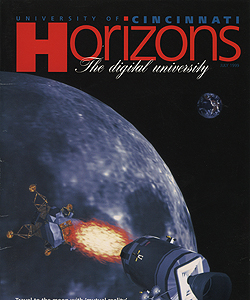Those were the good ol' days
My recent communication with "Horizons," regarding my election to the Herman Schneider Legacy Society, brought to mind my arrival at UC from Auburn University for my junior year, at age 18, and the shock of several professors saying "no credit" for similar courses there.
I decided to visit the dean's office in Baldwin Hall. At that point in time, applied arts was a part of the School of Engineering, and Herman Schneider was the dean. [His major is now part of DAAP.]
I was able to buttonhole him. On learning of my dilemma and knowing Frederick Biggin was my dean at Auburn, he literally took me by the hand, and off we went to Swift Hall. As luck would have it, Dean Schneider's favorite professor at Lehigh had been F. Biggin. Needless to say, there was no resistance, and I left with credits in hand, so to speak.
Then, between my junior and senior years, two professors allowed me to study at home in Georgia and take examinations on returning. The results: 5.5 on both. All of this, in addition to late afternoon and night classes, enabled me to graduate in two years.
I thought the enclosed might be of interest. Plus my gift annuity has been designated for scholarships in interior design, which was my major. In 1935, I was the sole male in the class. I transferred to UC because I would have been the only interior design major at Auburn.
Thomas Persons, DAAP '35
Atlanta, Ga.
Appalled by graduation rates
In the "Wall Street Journal" Weekend Section's lead editorial of March 19 [1999] concerning NCAA basketball, it notes that no player on the University of Cincinnati's basketball team has graduated in the past seven years. If that statement is anywhere near accurate, I -- along with many other UC alumni, I am sure -- am appalled.
It makes me wonder into what sort of an ethical and moral morass the university's athletic department has fallen. Where is the department in its recruiting of basketball-playing "students" that not one of them can manage to graduate? What is it telling these prospective "students"? And what does this say to the university's real students, the ones who struggle to earn their degrees, the ones whose parents (or themselves) may be carrying the full freight of their tuition and other expenses at UC?
I have always taken pride in being a UC graduate. And even after many, many years, I continue to boast about UC's winning its first NCAA basketball championship my senior year. Every senior on the team that year, I believe, graduated. Yet, since the WSJ editorial appeared last week, three associates have commented to me about the article and have guffawed at what sort of an academic institution UC must really be.
Again, if the WSJ statement is true, UC should think seriously about cleaning up its act athletically, first, perhaps, by finding a coach and an athletic director who recognize what the university's principal raison d'être really is, a coach and an athletic director who will recruit players on that basis.
I am not so naïve as to be unaware that income from basketball is a principal contributor to the support of UC's athletic program, but UC is still fundamentally -- I hope -- an academic institution, not a quasi-professional sports organization with educational and research programs attached.
Perhaps not very loyal sounding, but I was delighted that the basketball team representing UC in this year's NCAA championship tournament got no further than it did. As have so many other UC graduates, I worked hard for my degree from UC. I don't want its value -- even if it is just its perceived value -- compromised by the sort of academic hypocrisy that refers to members of UC's recent basketball teams as "student-athletes."
Richard Sherman, A&S '61
Wayne, Pa.
Editor's note: The NCAA tracks graduation rates based on the number of players who entered the program as freshmen and graduated within a six-year time window. It does not count students who transfer from a junior college or graduate after six years.
Of the 30 UC basketball players who have completed their eligibility since Coach Bob Huggins started at UC a decade ago, 13 have graduated.

 Past Issues
Past Issues